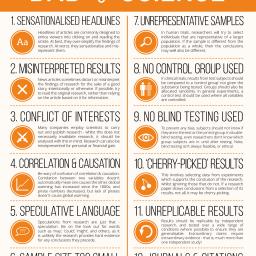Spotting Bad Science
 Compound Interest , a chemistry blog, has posted an infographic guide to spotting bad science. Among the listed things to watch out for are perennial favorites "Correlation & Causation" and "Sample Size Too Small".
Compound Interest , a chemistry blog, has posted an infographic guide to spotting bad science. Among the listed things to watch out for are perennial favorites "Correlation & Causation" and "Sample Size Too Small".The author was inspired to create the guide after running into so many of these gotchas while doing online research for a different article. It is in no way intended to be comprehensive, but instead to act as a brief reminder of what things to be alert for when reading science news articles and research results.
Guides like this might be overly simple for the readership of a site like Pipedot, but I personally find them useful as refreshers, much as I do the excellent TechNyou video series "Critical Thinking" and "This Thing Called Science" which, though aimed at high-schoolers and below, are still a good foundational resource. Then again, I like bright colors and shiny objects.